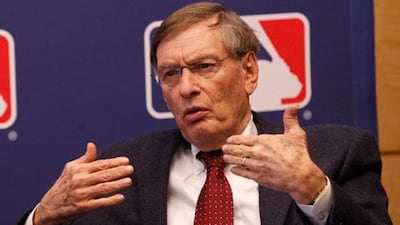As September dawned, Major League Baseball's pennant fever was decidedly low grade. Seven of the eight play-off slots seemed spoken for. Only the Texas Rangers and Los Angeles Angels of Anaheim in the America League West injected any suspense at the time.
With so many teams thinking ahead to 2012, fewer ballpark seats would be occupied. Fewer fans would push back bedtime on weeknights to watch, hear or read the final out of their games on Twitter.
Inevitably, the annual hue and cry for an expanded post-season field was cued up. The more participants, goes the argument, the better.
Make sure a wide-angle lens is required to include all September contenders in a group photograph.
Given the number of clubs that had already raised a flag of surrender, the clamour to open the post-season gates to two or four more was louder than normal. To that, I say, turn down the volume. To zero.
Opening the gates means lowering the bar. Baseball's formula of "eight in, 22 out" assures an October cast of the highest order.
What, you prefer the NBA and NHL? Granted, their play-offs are fraught with drama, but in bits and pieces scattered over more than two months. Besides, qualifications for involved teams are so modest that the majority (16 of 30) get through.
High-fives for the NFL, where only 12 of 32 teams pass post-season muster. With its one-and-done format, professional football could justify another layer, but it would rather put stock in the regular season and not dilute the aftermath.
No surprise that Bud Selig, the baseball commissioner, is campaigning for a lengthier baseball play-offs. That is what commissioners whose sports are not printing money do. Extra games would sweeten MLB's contract with the networks, though not by the spoonfuls of sugar he envisions.
"We only have eight of 30 teams" advance," the commissioner said at the All-Star Game break. "That's the least number in [major] sports.
"If we go to 10 ... that's not too many. I can make a case for 10, no more than 10."
Before they add a team from each league to form an entire wild-card round let us examine how it would work. Not smoothly, by any option.
For the lobbyists of a one-game "series" between the two sets of wild cards: are you serious?
What if one wild card entry wins, say, 96 games, and the other in their league 84? No doubt which has proved superior. To stage a one-game knockout would be unfair to the "96". For the "84" to show their worth, a best-of-three series is necessary.
Fine. How would a three-game set work? First game here, second game there, third game back here? No, too much travel.
First game at one site, next two at the other? Sounds better. But if teams are commuting from one coast to the other, a day in between might seem necessary. Four days to wade through the two wild card series would put the main contenders on hold uncomfortably long.
Supporters of the status quo can hang their hopes on an enlarged play-offs getting lost in negotiations for the next labour agreement.
A post-season tweak is reportedly contingent on balancing the divisions. The simple solution is persuading a NL Central member - that's you, Houston Astros - to resettle in the AL West, which would end the folly of six teams in one grouping and four in another.
Team owners and the union must scratch off more critical issues from the agenda, from revenue sharing and drug testing to a proposed draft of international players. By the time the post-season formula comes up, they might be negotiated out.
We can only hope.
Meantime, two weeks after the expansionists were bemoaning the barely perceptible pennant fever, stuff has happened.
The Boston Red Sox's once-invincible wild card lead over the Tampa Bay Rays has shrivelled to three games. On the NL side, the St Louis have charged to within four-and-a-half games of Braves for the wild card. Out West, the Rangers and the Angels were separated by two-and-a-half games.
Temperatures are rising, if slightly. It might not be the potboiler expansionists prefer, but it is enough to heat things up for a nice, compact play-offs - the best of any big league sport.

